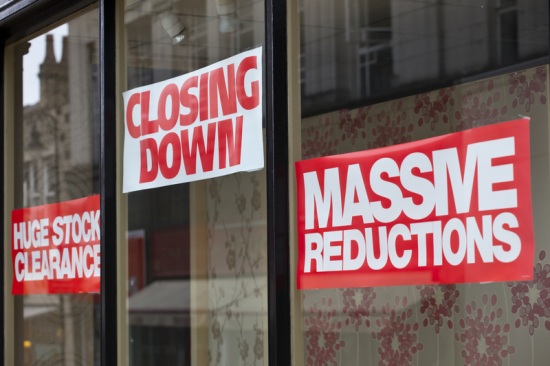According to a new SME Risk Index from international insurer Zurich, more than one in ten British small and medium-sized commercial property businesses say they have considered closing down in the last three months as a possible impact of the current economic state.

Eighty four per cent of commercial property SME decision makers are fairly/very concerned about the UK’s current economic climate, with 38 per cent very concerned. A further 84 per cent say they are not assured that the economic situation will improve in the next quarter, and more than two thirds are still not confident when looking into the future.
If the 11 per cent figure for those who have thought about shutting up their commercial property shop is stretched across the UK’s 4.5 million commercial property SMEs, it paints a gloomy picture of their current business confidence. In the North, 17 per cent of commercial property SMEs have considered closing down compared with just 7 per cent in London, 5 per cent in the Midlands and 12 per cent in the South overall. These figures further highlight the contrasting states of the economy in the North compared to the South.
This is Zurich’s first quarterly SME Risk Index, undertaken by market research agency YouGov, which provides valuable understanding into how Britain’s commercial property SMEs are responding to the current economic climate, with some taking drastic action in order to survive.
In spite of the gloomy outlook, Britain’s commercial property SMEs are beginning to fight back with many actively looking over their business models and looking for new opportunities. When asked which three things commercial property SMEs currently see as the biggest opportunity for their commercial property business, business innovation came out top with 33 per cent, followed by expense reduction and cost at 30 per cent and exploring online marketing and web-trading at 22 per cent. What’s more, in the last three months over half of commercial property SMEs have expanded activity to target new customers and one-third have branched out with their business offering.
The uncertainty and unpredictability within the Eurozone is adding to the pressure. Nearly half of commercial property SME decision makers believe the Eurozone crisis will hit UK consumer spending and confidence, with a knock-on, negative impact on Britain’s commercial property SMEs. 41 per cent of commercial property SME decision makers say that, if there business was seeking more finance; they would be likely to use investment of the partners’/owners personal capital to finance their businesses. Combined with the recent, excessive precipitation, which has had a damaging effect on nearly a third of commercial property SME businesses, this vital pillar of the UK economy is under real pressure.
Reassuringly, despite Eurozone concerns, the SME Risk Index shows that 22 per cent of British SMEs are looking to grow overseas through low-cost and virtual models, such as internet sales and web-trading, overseas distribution partnerships and overseas joint ventures. Only 10 per cent of commercial property SMEs plan to increase their physical presence overseas.
Director of SME, Zurich, Richard Coleman, commented: “It is clear that SMEs are feeling the strain of an uncertain economic environment. Our research shows that confidence has been hit and they are concerned about the future.”
Coleman further added: “While it’s encouraging that SMEs are looking for new opportunities to ease the pressure, there are considerable risks associated with development and expansion, particularly when owners are using personal capital to fund such activity.”
“This makes it vitally important that SMEs have a complete understanding of the risks present in such a fragile environment, and are fully capable of taking the appropriate steps to mitigate this risk and minimise the impact of external pressures.”
Zurich’s new SME Risk Index will be released four times a year and tracks SME sentiment and outlook across a range of critical risks and emerging challenges, including the economy, funding, growth, technology, severe weather, and Government policy and regulation.